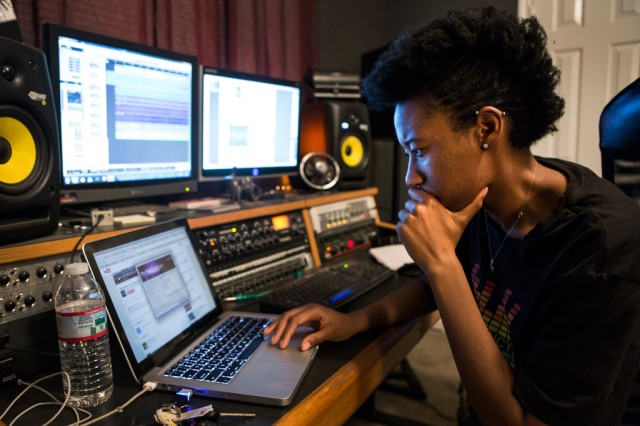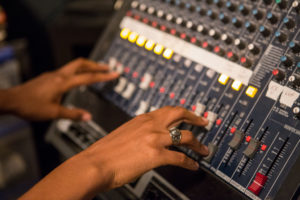In Music Industry, Women Are Behind the Mic, But Rarely Running the Board
By Ali Killian
Reporting Texas

Raechelle Steward, a student at UT-Austin, is among a small number of female sound engineers working in the music industry. Photos by Rocio Tueme/Reporting Texas
Beyoncé, Ariana Grande or Nicki Minaj might have written your favorite song, but chances are slim that a woman engineered the track.
A boys’ club culture in sound engineering is so entrenched that in his two decades of recording more than 500 albums in Austin, Tim Dittmar has worked with just one female engineer, and she was an assistant. Nationally, the odds are roughly 1 in 10 that a sound engineering technician is a woman, the most recent U.S. Department of Labor numbers show.
To help turn this around, Dittmar, the owner of Las Olas Recording, recruits women to the Music Business, Performing and Technology program at Austin Community College, where he has taught for 15 years. Raechelle Steward juggles four part-time audio tech jobs with classes at the University of Texas at Austin, where she plans to graduate in May from the Butler School of Music with a recording technology degree.
As moonlight pierced the glass exterior of UT’s Student Activity Center on a recent evening, Steward, 24, set up audiovisual equipment for a range of activities — from small events in meeting rooms to concerts in the auditorium. Seated cross-legged in a black chair in the center’s A/V office, she described a few of the barriers to breaking into the boys’ club. For one, she rarely encounters people who look like her, an African-American woman, in the Butler recording studio. And, she said, men often assume she needs help carrying her equipment.
“It’s not enough just to have talent,” Steward said. “It’s about knowing people, and these people are from the same communities … which can be hard for a minority in any sense. You have to find some commonality to latch onto to ingratiate yourself into this club.”
At this month’s Grammy Awards, four of the five nominees for Record of the Year were women, creating an illusion of female saturation in the industry. Then you talk with Steward, engineer Chris Payeur and Gina Fant-Saez, who opened Austin’s first Pro Tools digital audio studio in 1997. They work in a climate that is similar to that of more traditional STEM — science, technology, engineering and mathematics — fields. Men are in charge most of the time, and women learn to develop a thick skin or risk being alienated.

Raechelle Steward works the mixer at Blak Marigold
Pro Multimedia Studio in Round Rock.
“You have to be extra strong,” Steward said, “because anybody that whines, well, you’re gonna get talked about. You’re gonna get talked about real bad.”
Even being the founder of a recording studio, Blue World Music, did not insulate Fant-Saez, 52. “It has been an issue sometimes where I’ll be engineering, and I will definitely get the feeling that the people I’m recording resent that there is a woman at the helm,” she said.
Gender socialization, such as teaching engineering as a “boy thing,” begins at very early ages, said Lynette Osborn, a UT sociology lecturer. Educators subtly or unconsciously steer girls away from technology and boys toward it, creating an “anti-female” STEM-education culture. “It just kind of gets worse when you go into the workforce,” Osborn said.
Many decisions in music and the so-called culture industries are made in social settings such as bars and restaurants, according to Allyson Stokes, a UT sociology postdoctoral fellow. Because men dominate the most powerful networks, those activities are often “stereotypically masculine,” she wrote in an email.
“This type of lifestyle is hard to negotiate with, for example, motherhood, since women continue to bear the brunt of responsibility for child care, domestic labor and the organization of family life,” Stokes added. “This can result in a lot of women dropping out of culture industries once they have children.”
Payeur, a live-audio engineer who has worked with the Austin City Limits Festival and the popular band Spoon, knows that all too well. “I don’t tour, because I’m a mom,” she said. “I did try to go into the recording studio as a mother, but my six-hour sessions turned into 14-hour sessions. That was impossible for me to do as a mother.” Now, she works as a freelance engineer and runs a few Austin venues.
Payeur, 48, who has worked in the Austin music scene since 1991, began tinkering with technology as a child. “My dad gave me a transistor radio, and when I was 7 I was pulling the radio apart and putting it back together,” she said.
Technology also fascinated Steward from a young age, and both women believe that’s the key to increasing female representation in audio engineering jobs.
“I was 6 … we had this old computer, MS-DOS with a black screen, and you had to type in these commands,” Steward recalled. “My mom would just give me this sheet of paper and be like, ‘Type in all of this, and you can play your game.’” In her senior year at the High School for the Performing and Visual Arts in Houston, Steward’s affinity for technology met her passion for music. She decided to become an audio engineer.
Professionals agree that a culture shift will increase women audio engineers’ success, though progress may seem slow. At next month’s South By Southwest Interactive conference, at least six sessions are scheduled to focus on gender inequality in technology. But none of the panels specifically addresses the lack of women in audio engineering.
“People are more aware of [changing] gender roles,” Dittmar said. “And I think as those barriers get broken down, you will have more women enter the field.”
For Steward, there is no waiting.
“Especially in the entertainment industry, people will complain about there being no opportunities,” she said. “The truth is there are opportunities, but they’re just sitting there, waiting. You have to go out and grab it. They’re not going to give it to you, especially being the minority.”
Follow the reporter on Twitter: @ali_killian